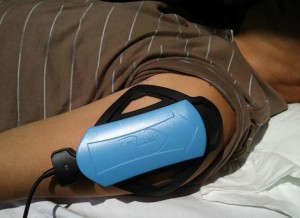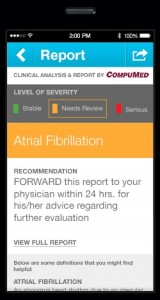 This year, MobiHealthNews covered many digital health milestones, including four IPOs, about $2 billion in funding, 33 merger and acquisition deals, and the entry of some big name companies in the space. But, this year also included some important moves by the FDA and, as always, a number of FDA clearances for digital health apps and devices.
This year, MobiHealthNews covered many digital health milestones, including four IPOs, about $2 billion in funding, 33 merger and acquisition deals, and the entry of some big name companies in the space. But, this year also included some important moves by the FDA and, as always, a number of FDA clearances for digital health apps and devices.
In August, the FDA proposed to largely deregulate a sizable list of Class II and Class I medical devices and no longer require their makers to go through the 510(k) process. These devices included thermometers, smart body scales, stethoscopes, and some ophthalmic cameras.
Still, there were many devices that did get clearances this year -- by MobiHealthNews' count there were at least 31 new FDA 510(k) clearances for digital health.
Devices cleared this year include an app that uses the iPad’s camera to estimate the amount of blood lost during a surgery, a smartphone-connected thermometer, an iOS application that treats a medical condition called tinnitus, and a vitals sensing chair. There was even one mysterious clearance from South Korean technology company LG Electronics for something called "LG Smarthealth".
Here are the 31 digital health FDA clearances from 2014:
2014 Q1
New York City-based Kinsa Health received FDA 510(k) clearance for its Kinsa smart thermometer, which can be used, orally, under-arm, or rectally. The device transmits data to a companion smartphone app.
Samsung’s S Health app received 510(k) clearance from the FDA as a cardiology signal transmitter suggests that the clearance will allow S Health to interface with additional connected medical devices in the United States.
The FDA cleared the second generation of Waltham, Massachusetts-based EarlySense’s passive and contactless bedside monitor, which continuous measures respiration rate, heart rate and motion. Among the changes to the system are more sophisticated management tools to help administrators better measure and track quality goals.
Alere Connect, formerly known as MedApps before it was acquired by Alere, announced FDA clearance for its latest home health hub, HomeLink.
A British company, Camntech, received FDA clearance for a motion-tracking wristband and a wristworn electronic diary, likely for use in clinical trials. The devices are called the MotionWatch 8 and PRO-Diary.
Carestream received FDA clearance for VUE Motion, a mobile radiology viewing and reading software that can be accessed on iPhone 4s, iPad 2, Galaxy Note and Galaxy S III mobile devices.
Remote patient monitoring company HealthInterlink received FDA 510(k) class II clearance for Beacon 2.0, a mobile-centric software system that integrates data from various home health devices. Beacon was previously classified as a class I medical device (MDDS). By year-end news emerged that Welch Allyn had acquired HealthInterlink's assets.
2014 Q2
 Propeller Health, formerly Asthmapolis, received FDA clearance for a platform that includes a new smart inhaler for patients with either asthma or COPD.
Propeller Health, formerly Asthmapolis, received FDA clearance for a platform that includes a new smart inhaler for patients with either asthma or COPD.
In June San Francisco-based Qardio received FDA 510(k) clearance for its connected blood pressure monitor, called QardioArm. The device went on sale for $99 on Qardio’s website and in select stores the following week.
New Zealand-based medical device company Nexus6 received FDA clearance for its smartphone-connected inhaler, SmartTouch, as a class II medical device. The new SmartTouch device was cleared as a prescribable Metered Dose Inhaler (MDI) with a handful of intended uses: in clinical trials; in clinical practice, and for patient self-management.
Atlanta, Georgia-based health device maker CardioMEMS received FDA clearance for its CardioMEMS HF System, which monitors pulmonary artery pressure. The clearance was only for patients who have experienced New York Heart Association (NYHA) Class III heart failure and have been hospitalized for heart failure in the previous year. Later in the year St. Jude announced its intention to buy the company, which it had been a longtime investor in.
Alberta, Canada-based Calgary Scientific announced that it received a new FDA clearance for its diagnostic medical imaging software, called ResolutionMD, that enables providers to use the mobile software for all imaging modalities, except mammography.
McKesson secured clearance for a mobile medical app called McKesson Cardiology ECG Mobile. The web-based version of McKesson Cardiology ECG has been around for a few years and it enables clinicians to analyze and review ECG waveforms captured by a variety of vendors’ ECG devices.
 InTouch Health received clearance for an app that would allow auscultation from digital stethoscopes in near-realtime. InTouch says that up until now digital stethoscopes have relied on store and forward technology, but InTouch’s CS App transmits live from a patient to a doctor at a remote location.
InTouch Health received clearance for an app that would allow auscultation from digital stethoscopes in near-realtime. InTouch says that up until now digital stethoscopes have relied on store and forward technology, but InTouch’s CS App transmits live from a patient to a doctor at a remote location.
Reflectance Medical secured a 510(k) clearance for a tablet-based version of its Multi-Parameter Mobile CareGuide 3100 Oximeter system. The original device offers a “non-invasive assessment of hemoglobin oxygen saturation and pH in a region of skeletal muscle tissues beneath the oximeter sensor,” according to the company.
Vital Connect received FDA clearance for its Vital Connect Platform, which is the system that supports the company’s peel-and-stick, Bandaid-like vital signs monitor HealthPatch. The wearable device captures single lead ECG, heart rate, HRV, respiratory rate, skin temperature, body posturing (fall detection), steps, stress, and sleep staging. The company also received FDA clearance for the system's use in the home.
Gauss Surgical announced that it has received de novo FDA clearance for an app that uses the iPad’s camera to estimate the amount of blood lost during a surgery and captured with surgical sponges. The system is called the Triton Fluid Management System.
Entra Health Systems, one of the earliest entrants into the smartphone-connected glucometer space, received clearance for the MyHealthPoint telemedicine manager, an online and mobile software offering that would collect and store biometric data from a variety of sources. It measures vitals including glucose, blood pressure, weight, body composition, activity, body temperature, ECG, and pulse oximetry.
2014 Q3
Waltham, Massachusetts-based EarlySense, which makes a passive and contactless bedside monitor that continuously measures respiration rate, heart rate and motion, has received a new FDA clearance for a sensor designed to work with not a bed, but a chair.
 Another clinically-focused, activity tracking wearable has now been cleared by the FDA, this one aimed specifically at the monitoring and treatment of Parkinson’s disease. The Personal KinetiGraph, from Melbourne, Australia-based Global Kinetics Corporation, “offers comprehensive, automated reporting of a Parkinson’s disease patient’s movements so that neurologists and other physicians can more easily identify changes in movement symptoms to assist in decisions to optimize therapy,” according to the company.
Another clinically-focused, activity tracking wearable has now been cleared by the FDA, this one aimed specifically at the monitoring and treatment of Parkinson’s disease. The Personal KinetiGraph, from Melbourne, Australia-based Global Kinetics Corporation, “offers comprehensive, automated reporting of a Parkinson’s disease patient’s movements so that neurologists and other physicians can more easily identify changes in movement symptoms to assist in decisions to optimize therapy,” according to the company.
Otoharmonics, a startup out of the Baker Group supported by Cedars-Sinai Medical Center, received FDA 510(k) clearance for an iPad or iPod Touch application that treats a medical condition called tinnitus.
Australian company dorsaVi received FDA clearance for its ViMove sensor system. The sensor tracks movement as well as muscle activation, and is intended to be used in a clinical setting or with athletes in training.
AliveCor has received an additional FDA 510(k) clearance, this time for an algorithm that allows its smartphone ECG to detect atrial fibrillation — an abnormal heart rhythm that isn’t always detectable to the patient, but if left untreated can lead to stroke or congestive heart failure — with high accuracy.
New York City-based medical device maker Philosys received FDA 510(k) clearance this week for its smartphone-connected glucose meter, Gmate Smart.
2014 Q4
At the beginning of the fourth quarter, Phillips received FDA 510(k) clearance for two of its telehealth applications, eCareCoordinator and eCareCompanion. Both apps are part of a Philips program called Philips Transition to Ambulatory Care (eTrAC), which aims to reduce hospital readmissions by providing patients with the tools to make their transition to the home. Philips developed the apps this summer as part of a partnership with Salesforce to build an open, cloud-based platform that helps caregivers manage patients. Saleseforce said it expects that this platform will eventually offer patients tools that range from self-care and prevention, to diagnosis and treatment through recovery and wellness.
Dexcom Share, a cradle device that allows users to send data from a Dexcom continuous glucose monitor to multiple smartphones, received 510(k) clearance from the FDA. The system is designed to help parents and caregivers remotely track the glucose of a child, elderly parent, or spouse when the diabetes patient is at home or stationary.
The FDA granted 510(k) clearance to a mobile-based cognitive test called DANA (Defense Automated Neurobehavioral Assessment), which helps healthcare providers better assess the medical or psychological state of their patients. DANA was developed by Silver Spring, Maryland-based AnthroTronix, a digital health R&D company, and it was developed partially thanks to funding from the US Navy Bureau of Medicine and Surgery as well as a Rapid Innovation Fund award from the US Army. The latter led to DANA being used to help evaluate the medical status of deployed military service members in Afghanistan.
South Korean technology company LG Electronics received an FDA 510(k) clearance for something called “LG Smarthealth”. The move indicates that LG might be playing catch-up with electronics competitor Samsung, which received a similar clearance for its S Health app last year. While there is no reference to LG Smarthealth on the company’s website, several of LG’s G3 smartphones do sport LG Health, a tracking app that’s been available since at least July.
Swiss remote cardiac monitoring company LifeWatch received FDA 510(k) clearance for LifeWatch VSP (Vital Signs Patch), the company’s adhesive patch for remote patient monitoring. The device is a disposable adhesive strip which contains sensors to monitor ECG, heart rate, respiration rate, temperature, saturation, and movement. It also contains a battery which allows the device to collect data continuously for five to seven days.















